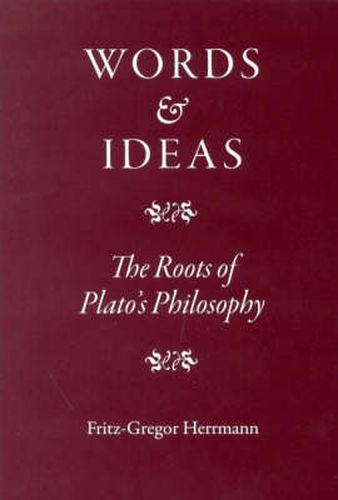Readings Newsletter
Become a Readings Member to make your shopping experience even easier.
Sign in or sign up for free!
You’re not far away from qualifying for FREE standard shipping within Australia
You’ve qualified for FREE standard shipping within Australia
The cart is loading…






Plato did not create his philosophy ex nihilo, but rather drew on four centuries of literary production in epic and lyric poetry, as well as on ethnography and historiography, tragedy and comedy, medical and mathematical research, oratory and rhetorical theory. Words and Ideas offers a study of Plato’s philosophical language against this cultural background, retracing to their origins the history and development of the key terms of the Theory of Forms as presented in the phaedo. ‘Form’ or ‘idea’, ‘essence’ or ‘being’, ‘participation’, ‘presence’ and ‘community’ are among the terms investigated. The aim is to determine the precise historical and philosophical contexts on which Plato drew in the formulation of his thoughts. In tracing the roots of Plato’s philosophy, Words and Ideas demarcates afresh Plato’s position regarding the protagonists of pre-Socratic philosophy: Parmenides and the Eleatics, Anaxagoras and Diogenes of Apollonia, Leucippus and Democritus, Philolaus and the Pythagoreans. This identification of his sources allows us, in many cases for the first time, to judge what in the arguments of the dialogues is Plato’s own contribution and what is there only as part of a philosophical or pre-philosophical inheritance.
$9.00 standard shipping within Australia
FREE standard shipping within Australia for orders over $100.00
Express & International shipping calculated at checkout
Plato did not create his philosophy ex nihilo, but rather drew on four centuries of literary production in epic and lyric poetry, as well as on ethnography and historiography, tragedy and comedy, medical and mathematical research, oratory and rhetorical theory. Words and Ideas offers a study of Plato’s philosophical language against this cultural background, retracing to their origins the history and development of the key terms of the Theory of Forms as presented in the phaedo. ‘Form’ or ‘idea’, ‘essence’ or ‘being’, ‘participation’, ‘presence’ and ‘community’ are among the terms investigated. The aim is to determine the precise historical and philosophical contexts on which Plato drew in the formulation of his thoughts. In tracing the roots of Plato’s philosophy, Words and Ideas demarcates afresh Plato’s position regarding the protagonists of pre-Socratic philosophy: Parmenides and the Eleatics, Anaxagoras and Diogenes of Apollonia, Leucippus and Democritus, Philolaus and the Pythagoreans. This identification of his sources allows us, in many cases for the first time, to judge what in the arguments of the dialogues is Plato’s own contribution and what is there only as part of a philosophical or pre-philosophical inheritance.